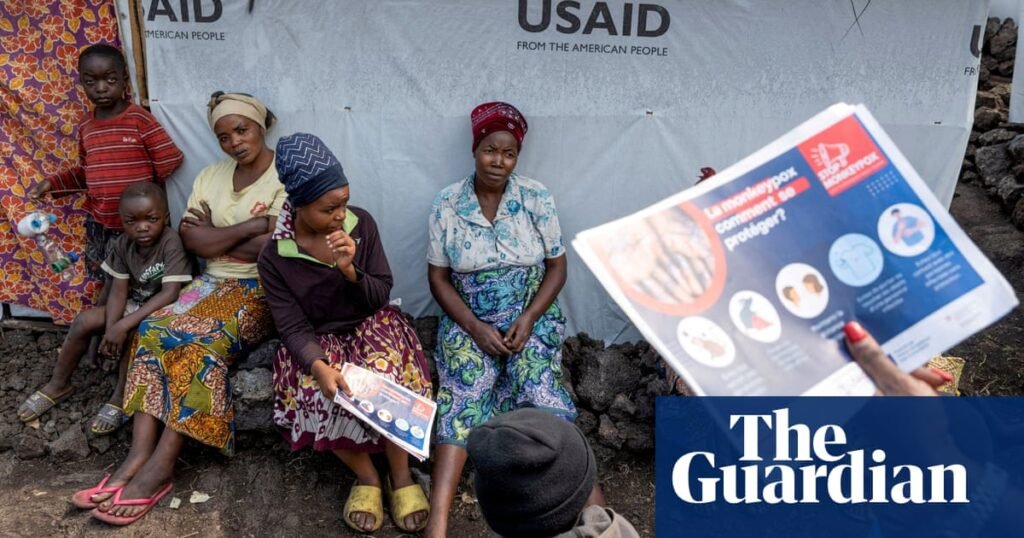Doctors and nurses battling MPOX in the Democratic Republic of Congo aren’t just fighting the virus — they’re also facing a tide of rumours and misinformation.
With the first of millions of promised doses of the MPOX vaccine finally starting to arrive, the focus is now on ensuring those who need the vaccine get it when the vaccination campaign starts next month, as well as educating the wider community on how to protect themselves.
Conspiracy theories circulating across the country include that MPOX was invented by whites to sterilize the Congolese with a vaccine, or that it’s simply a money-making scheme for pharmaceutical companies. Distrust of medical institutions and treatments is often a legacy of racist colonial policies.
“This kind of misinformation spreads (faster) than normal information,” said Dr. Junior Muzi, research director at Banga Hospital in western Democratic Republic of Congo.
About 26,000 cases of MPOX have been reported across the DRC this year, and authorities are working to dispel myths, educate people on how to prevent infection and where to get treatment, and lay the groundwork for vaccination uptake.
Vaccination campaigns will be highly targeted, initially offering vaccines to high-risk groups such as frontline health workers and contacts of known infected people, but information on prevention and self-care, including the importance of regular hand-washing, needs to reach everyone.
A UN Children’s Fund (UNICEF) poll of almost 200,000 people in the Democratic Republic of Congo this month found that only 56% had heard of MPOX, and knowledge about its symptoms, how the virus is transmitted and how to prevent it was patchy.
Disseminating reliable information is a tricky field: the Democratic Republic of Congo is a vast country, with many remote areas difficult to access by road, and less than half the population has a mobile phone.
The conflict has forced many people to flee, and Muzi stressed that “there is a trust issue between politicians and the people.”
He recently participated in a broadcast phone interview about MPOX, saying, “It was clear from the questions I received that people did not have the right information. I told them that this is not a disease that came from people in the U.S. or Europe, it has been in our country for some time and is now epidemic.”
A Red Cross worker explains MPOX to displaced children at Don Bosco refugee camp in Goma. Many people in the Democratic Republic of Congo consider MPOX a form of punishment. Photo: Moise Kasereka/EPA
Muzi’s hospital is used to seeing MPOX patients brought in from the countryside after eating diseased bushmeat, treating about five a month, mostly young children. “We know the disease,” he says.
But the new variant, which historically has not spread throughout the DRC and has reached as far as India and Sweden, is now making the country the epicenter of an international public health emergency, meaning “a lot of people don’t know exactly how to deal with these cases,” Muzi said.
He said people with MPOX have long faced stigma: “People will find a reason to say, ‘This family did something bad, they’re being punished.’ It’s not easy, but the only way to combat misinformation is to provide the right information.”
Conspiracy theories are also circulating in Goma, the capital of North Kivu province.
“Why are infectious diseases like Ebola and measles so common in our country but not in other countries? I think Western countries are trying to weaken our country by spreading diseases,” said Irankunda Alice, a 40-year-old seamstress.
“I believe the epidemic in the country is the creation of foreigners who are greedy for money and want to stifle Africa’s population growth,” said Gloire Kikandi, 30, a peddler.
“Just as paracetamol manufacturers want to sell their products when you have a bad headache, foreign pharmaceutical companies may want to make billions of dollars selling vaccines,” said Gershom Risasi, a 60-year-old teacher. “Foreigners are looking for ways to weaken our health and thus seize the natural resources of the eastern part of our country.”
Dr. Rodrigues Quisand, a doctor in Goma, said rumours have also spread during previous epidemics, including Ebola and COVID-19. “When people don’t have access to information, they believe rumours,” he said.
“In the Congolese situation, epidemics emerge when there is a crisis of trust between the rulers and those in power. Some even believe in conspiracy theories. Some think the epidemic was created abroad.”
“That’s why we can’t wait until an epidemic to communicate,” Kissand added.
UNICEF is working with governments to disseminate accurate polio information through a network of “community action groups” made up of local chiefs, religious leaders, frontline workers, teachers, social workers and women.
“These groups will be briefed and trained, then go out into the communities to spread the information in public places such as markets and motorbike (taxi) stands,” said Sophie Chavanel, communications specialist at UNICEF in the Democratic Republic of the Congo.
“But they also go door to door to provide the right information. They take little plastic chairs, sit down with mothers and neighbours and start a discussion.
“Because they’re from the community, you can trust what they have to say more than what an outsider might say or what you might hear on social media,” she says.
Misinformation is not an insurmountable obstacle: A UNICEF poll that found awareness of the virus was low found willingness to get vaccinated to be relatively high: 75% of people said they would get vaccinated if offered the shot.
“It’s not a high level of hostility, per se, but rather it’s about starting a discussion,” Chavanel said.
“From my experience, and from having been in this job for quite some time, it’s really important to make sure people have the right information. And it’s really about the exchange of information – listening to people’s concerns and responding with answers to those concerns.”

